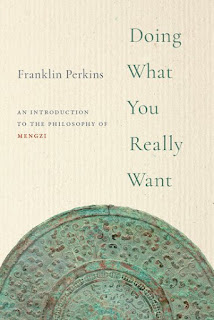 are not Humane: The Problem of Evil in Classical Chinese Philosophy (2014), Leibniz: A Guide for the Perplexed (2007), and Leibniz and China: A Commerce of Light (2004), and was co-editor of Chinese Metaphysics and Its Problems (2015). His books have been translated into Portuguese, Chinese, and Japanese. Perkins has spent more than eight years teaching and conducting research in Asia, and has previously been a professor at Nanyang Technological University and DePaul University, where he was also the director of Chinese Studies program.
are not Humane: The Problem of Evil in Classical Chinese Philosophy (2014), Leibniz: A Guide for the Perplexed (2007), and Leibniz and China: A Commerce of Light (2004), and was co-editor of Chinese Metaphysics and Its Problems (2015). His books have been translated into Portuguese, Chinese, and Japanese. Perkins has spent more than eight years teaching and conducting research in Asia, and has previously been a professor at Nanyang Technological University and DePaul University, where he was also the director of Chinese Studies program.
He applied the “Page 99 Test” to his new book, Doing What You Really Want: An Introduction to the Philosophy of Mengzi, and reported the following:
Page 99 discusses Confucian views of fate (ming 命), that is, situations where success and failure are not within our control. I quote a passage from Mengzi: “If seeking attains it and abandoning loses it, then seeking has benefits for attaining. The seeking is within me. If the seeking has the way but attaining involves fate, then seeking is of not benefit to attaining. This is seeking in the external” (Mengzi 2A7). The recognition that success and failure are outside of our control has two functions. It tells us where to direct our effort: we can control our character (the internal) and so we should focus on cultivating that. At the same time, recognizing the limits of what we can control allows us to more easily accept bad events, leading to something like peace of mind (which is discussed in the pages that follow).Learn more about Doing What You Really Want at the Oxford University Press website.
Does the Page 99 Test work for my book? Page 99 doesn’t contain any of the most essential philosophical points. The previous chapters follow Mengzi in arguing that our deepest concerns are for our relationships with other people and then show how these concerns can be extended and cultivated into motivations for trying to make the world a better place. That often involves sorrow, worry, and stress. Page 99 appears in a chapter on how to keep that concern for the world but still enjoy life. Page 99 is not so much about enjoyment but rather how to avoid the negative feelings that easily arise if we try to make a difference in the world. One way is to focus on what we can control—our own choices and our character—rather than on the outcomes. As I say on that page, Stoics appeal to fate in a similar way.
Even so, page 99 does capture the character and purpose of the book pretty well. The problems addressed on that page are concrete and common: if we genuinely care about the world, how do we deal with all of the suffering, violence, and inequality that we cannot address? The strategies also are practical and realistic. As I say there, we employ a similar view when we say things like “there was nothing you could do about it” or “it was meant to be.” A few pages later I point out that this is a strategy rather than an absolute claim. Mengzi is not a Stoic. He thinks we should be upset when innocent people suffer or when a family member is in trouble. But we can’t be upset all of the time, so looking at what is and is not within our control is a way to bring about some emotional balance.
So, while page 99 will not give you an essential aspect of Mengzi’s philosophy, it is a pretty good basis for judging whether or not you will want to read the whole book. And it does have some good practical advice.
--Marshal Zeringue



